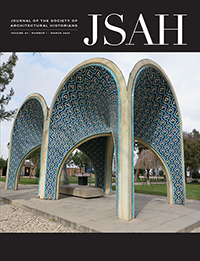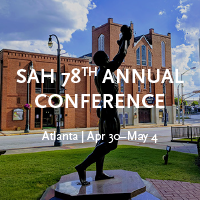-
Membership
Membership
Anyone with an interest in the history of the built environment is welcome to join the Society of Architectural Historians -
Conferences
Conferences
SAH Annual International Conferences bring members together for scholarly exchange and networking -
Publications
Publications
Through print and digital publications, SAH documents the history of the built environment and disseminates scholarshipLatest Issue:

-
Programs
Programs
SAH promotes meaningful engagement with the history of the built environment through its programsMember Programs
-
Jobs & Opportunities
Jobs & Opportunities
SAH provides resources, fellowships, and grants to help further your career and professional life -
Support
Support
We invite you to support the educational mission of SAH by making a gift, becoming a member, or volunteering -
About
About
SAH promotes the study, interpretation, and conservation of the built environment worldwide for the benefit of all
Program Date: Wednesday, October 18, 2023
Q&A Report
Digital-assisted and automated modes of building documentation are rapidly transforming methods of recording architectural heritage worldwide. Because technologies such as remote sensing, machine-learning for typological recognition, and LiDAR can execute
batch tasks quickly and reliably, they are increasingly called upon to replace traditional field survey techniques guided by historians and local communities. While automated methods can significantly enhance architectural recording, they cannot capture
communities’ and historians’ knowledge of place. Communities gain such knowledge through their lived experience and practice, while historians gain insight into a place’s past through anthropological and archaeological methods. This
local and historically contextualized information can reciprocally inform the recording of architecture to preserve what is meaningful in a building or site. This panel considers the benefits of bringing this local and acquired knowledge to bear on architectural
recording itself, challenging the premise that automated recordings, such as those carried out by industrial scanning firms, are comprehensive and separable from these intellectual processes.
Through comparative
consideration of the panelists’ place-specific documentation goals, their approaches to visual communication and abstraction, their ways of representing uncertainty, and their reliance on local knowledge, the panel engages diverse perspectives on
the value of human-oriented recording techniques in an age of increasingly automated building documentation.
Speakers

Felix Arnold is a German architect working in archaeology. He graduated from the Technical University of Karlsruhe, Germany, with a doctorate in architecture. After receiving a travel grant from the German Archaeological Institute, he was a research associate at the Institute's departments in Madrid and Cairo. His field of work ranges from Pharaonic to Islamic architectural history. In Egypt, he has led projects at the pyramids of Dahshur and the ancient city of Elephantine. In Spain, he has worked in Almería, Córdoba, the Alhambra, and since 2016 at Madinat al-Zahra. His many publications include Islamic Palace Architecture in the Western Mediterranean. A History (Oxford University Press, 2017) and Ancient Egyptian Architecture in Fifteen Monuments (Cairo University Press, 2022). Since 2021 he is the scientific director of the Madrid Department of the German Archaeological Institute.

Akemi Hijioka holds a doctorate degree in architecture and urbanism from São Paulo University and is a specialist in Japanese construction. She lives in the municipality of Registro, where the focus of her research is located. She has experience in the field, and in restoration, including the restoration of the first listed wooden building of Japanese architectural tradition in Brazil. She has worked on the identification of techniques for data systematization and in the execution of structures for rebuilding on site. Hijioka has published scientific articles published in national and international journals and has organized workshops and lectures on various areas of architectural heritage.

Hector Yudi Yokoyama Inafuku is an undergraduate student of architecture and urbanism at the University of São Paulo whose experience includes researching the Brazilian wattle and daub technique as well as its Japanese version, tsuchikabe.

Alain Briatte Mantchev is an architect qualified by Craterre Architecture School of Grenoble in France. He works on location with traditional communities, specializes in construction with natural materials, and has extensive experience in field research, on-site construction, and georeferencing data on traditional buildings in the research region. Mantchev's extensive academic work experience was gained through field surveys, data collection, and georeferencing the region's cultural heritage.

Joseph C. Williams is an assistant professor of architecture at University of Maryland. He holds a Ph.D. in architectural history from Duke University, where he was advised by Caroline Bruzelius, and specializes in the knowledge and practice of premodern builders in South Italy and its Mediterranean orbit. He applies the methods of building archaeology, digital modeling, and cognitive theory to examine the role of construction activities in premodern design. Since 2019, Williams has directed “In the Shadow of Vesuvius,” a UMD archaeological work-study program, and is editing this work as a collection of drawings and essays. He has also authored Architecture of Disjuncture: Mediterranean Trade and Cathedral Building in a New Diocese (Brepols, 2020) and is currently researching the development of dome construction techniques in the Norman Kingdom of Sicily.

Wei (Windy) Zhao is an assistant professor in the School of Architecture at the University of Illinois at Urbana-Champaign, where she earned her Ph.D. Zhao’s research focuses on the built environment of underrepresented social groups and issues of social equity and sustainability, and cultural diversity. Zhao has published two books: one in Chinese and one in English. Her second book, Home beyond the House: Transformation of Life, Place, and Tradition in Rural China, was published by Routledge in 2022. Zhao is also a licensed architect in the United States, with professional degrees from Syracuse University and Tsinghua University in Beijing.

